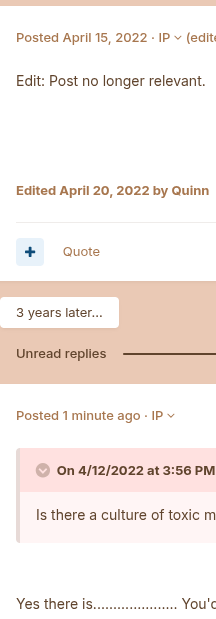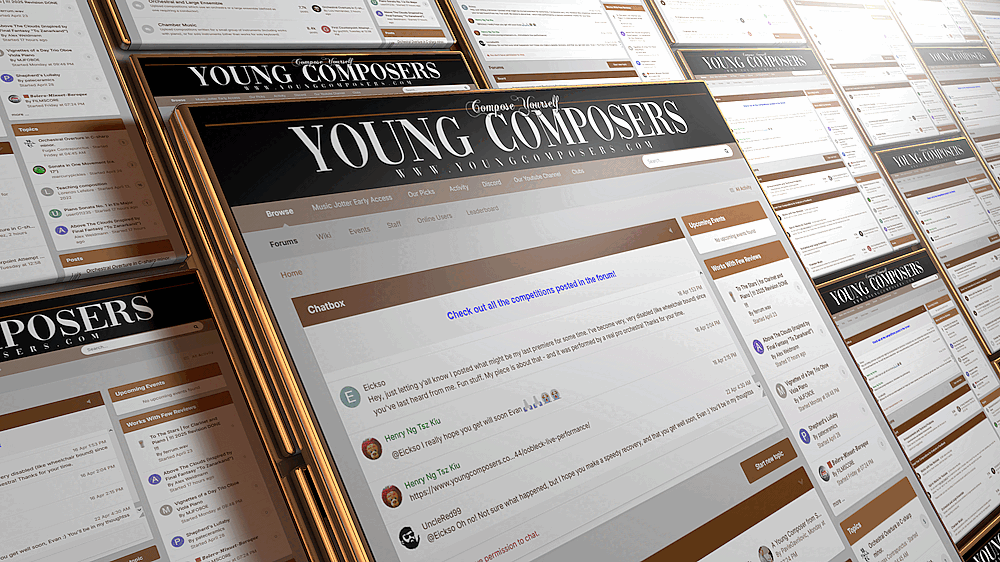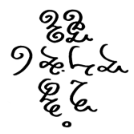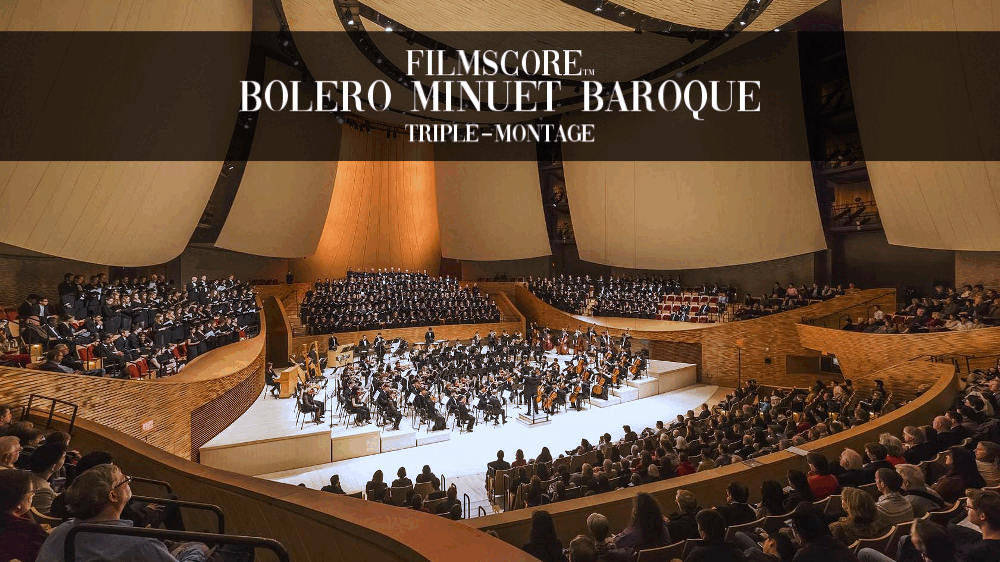All Activity
- Past hour
-
Piano Sonata No. 1 in Eb Major
user011235 replied to user011235's topic in Piano Music, Solo Keyboard
@Luis Hernández Thanks! Yeah the virtual piano is terrible lol. The speed though, do you mean you think it's a little fast? -
Henry Ng Tsz Kiu started following Is there a culture of toxic masculinity at YCF?
- Today
-
Fruit hunter started following MuseScore - what is it missing?
-
MuseScore - what is it missing?
Fruit hunter replied to Alex Weidmann's topic in Music Notation Software Help and Discussion
Condensing a score in Muse score is definitely not one key stroke, but is not as tedious as you may thought it’s a few more extra steps. I think you just have to go into the format of the score and click on condensed score or something. I’ve done that many times .even the sound mapping is more difficult than condensing a score. -

Is there a culture of toxic masculinity at YCF?
FILMSCORE replied to PeterthePapercomPoser's topic in Composers' Headquarters
Yes there is..................... You'd have to be blind not to see it in the Comments................But its not in the Majority............but in the Minority. "DENIAL IS NOT JUST A RIVER IN EGYPT"..................................Possibly has a Detrimental-Effect on the Young and Vulnerable. But L.I.F.E......... is a 4 letter word. -
The one thing that didn't quite work for me were the initial shifting rhythms in the piano in the opening bars. (Measures 5-7 in the right hand). It felt like the effect you were looking for was more like just a rit. and having everything written out into different triplets didn't quite give as smooth a change in tempo as perhaps you were trying to achieve? I really like this piece very much though! Sterling work! As neither a pianist nor a clarinet player, I can't speak to issues of playability. It seems like it would be a challenge to learn, but well worth the work! Very lovely!
-
PeterthePapercomPoser started following teaching composition
-

Do You Enjoy the Current Site Design?
FILMSCORE replied to chopin's topic in Announcements and Technical Problems
15 Years Later...............Maby a new........ "Top-Banner"........would intensify the sites Identity. -
Richard Smith started following teaching composition
-
This video explains the book 'for young composers (& their teachers)', which many instrumental teachers have found useful.
-
MuseScore - what is it missing?
Alex Weidmann replied to Alex Weidmann's topic in Music Notation Software Help and Discussion
It was my composition tutor who made the comment. He's a professional composer. He said MuseScore doesn't have the same granular control as Dorico or Sibelius. One thing that's definitely easier in Dorico, is switching to Film Score format. I gather it can be done at the touch of a button; whereas in MuseScore it's very fiddly. Also creating a condensed score for the conductor can be done with one keystroke in Dorico. Not sure if there's anything that simply can't be done in MuseScore though, as there are often ways of fudging things. I've never tried making an aleatoric score: so maybe that's one problem area? -
Henry Ng Tsz Kiu started following Teaching composition
-

Orchestral Overture in C-sharp minor.
Luis Hernández replied to Fugax Contrapunctus's topic in Orchestral and Large Ensemble
Of course, yes. I understood the intention of the third of mischief, giving a more optimistic ending. What I meant was that it's not something that romantics did. If we get into their way of thinking, everything was sad and gloomy in these kinds of pieces. But, of course, it's a choice to use it. -

Sonata in One Movement (ca. 17')
FILMSCORE replied to mercurypickles's topic in Piano Music, Solo Keyboard
Very True..................."Time is Money" -
Buenos días, Luis. Thank you very much for your kind words. As for the picardy third, its usage here isn't merely just a stylistic preference, it's also intended to be symbolic in nature, as the piece is sort of meant to evoke the feeling of a raging storm finally coming to a standstill, and that picardy third at the end represents the final glimpses of sunlight amidst the dark clouds, as well as the enlightenment that befalls a period of great pain, confusion and soul-searching. A subtly fleeting glimmer of hope, the omen of a rainbow as the ever-creeping conflict suddenly comes to an end. Muchas gracias por todo. 🙂
-
Richard Smith joined the community
-
There is a book 'for young composers (& their teachers)' published by Camden Music available from Chimes Music in London. I wrote it with this very topic in mind; many teachers have found it helpful.
-

Piano Sonata No. 1 in Eb Major
Luis Hernández replied to user011235's topic in Piano Music, Solo Keyboard
It sounds very good and I identify it in that early classicism style. I think it has good themes and a quite spectacular development. The only thing I have to object is that the union of the sound of the virtual piano and the speed of the piece makes (for me) that the musicality is lost a little. Greetings. -

Sonata in One Movement (ca. 17')
Luis Hernández replied to mercurypickles's topic in Piano Music, Solo Keyboard
This work is impressive and considerable. I think that for its length it has no comments. Nowadays it is difficult to hook people with extensive works. Greetings. -

Orchestral Overture in C-sharp minor.
Luis Hernández replied to Fugax Contrapunctus's topic in Orchestral and Large Ensemble
It is a beautiful little piece of work. I think that in this romantic style, the background of the counterpoint, which is what (I think) you master the most, is more than fundamental. Although some people don't pay it the attention it deserves. It's very emotional and that's why it's in the style. What I think is less frequent is to use the picardy third at the end. Greetings. - Yesterday
-
Hi to my fellow musicophiles! Here is my latest work, which was heavily influenced by Nobuo Uematsu's "To Zanarkand" from "Final Fantasy X" (after I came across it by chance on You Tube). The main thing I was aiming for, was to write something I could easily play myself, as a very rusty pianist. Though it's largely my work, I am still quoting some of the original material. (Hopefully not enough to be sued!) Happy to hear all your comments, even if you hate the idea of rewriting Uematsu! N.B. I've never played "Final Fantasy": so have no idea what the original music represents. It sounds quite floaty and ethereal: so hence my title.
-
A little piano sonata originally composed in 2018. I tried touching it up a bit... I'm still not happy with it (for example I left out any dynamics except in the beginning and ending measures), and i'm publishing it still in its rough form. Here's why: I think this piece illustrates one of the main problems I face when composing, which I've mentioned before but basically is: too many ideas for multiple ways i could do things, + lack of knowledge that would guide me to choose one of those options over another. I often feel like I have no guiding forces governing the choices I make when composing, and so I end up with pieces that don't have that cohesive deliberateness indicative of someone who really knows what they're doing. Any feedback is welcome, on this piece specifically or on how I could solve this greater issue with my composing. That being said, please enjoy 😅 I'm still quite fond of this sonata, it's got a decidedly galant sound but with my own idiosyncrasies thrown in.
-
An arrangement for choir and orchestra of my Overture in C-sharp minor, originally intended for string orchestra alone and first posted yesterday morning. As stated in the original post, this piece's overall character stems from the metaphor of a harsh storm passing, as hinted by the German title shown in the score: "Der abflauende Sturm" (roughly translatable as "The Passing Storm"). Alongside the initial version of the score, now transposed one half-step lower to C minor, two flutes, two oboes, a basoon and a five-part choir have also been added (though only the vocal parts are shown in the video itself, as the others are doubling each voice respectively). The latter's lyrics are a poem I wrote in German more than 3 years ago, back in late April 2022, which reads as follows: Im kaltesten Winter hätt' ich weder Mantel noch Decke, auch keine warme Suppe oder rauchige Salzkartoffeln, nicht mal Orten neben Schornstein, kein Licht einer Kerze. Im heißesten Sommer wär' ich an keinen goldenen Stränden, auch kein' üppigen Wälder will ich schon besichtigen, zwischen Wolken erreichen mich keine Sonnenstrahlen. Entweder ganzleblich, Jahr über oder seit einer Instant gibt es im ganzen Welt nichts was ich will, und es finden können nirgends weder ich noch niemand. Each of the three stanzas are almost evenly distributed across each of the five voices: the basses and tenors sing the first one, the altos and mezzosopranos the second, and the third is reserved for the sopranos. This poem happened to be exceedingly convenient in length to set music to, an advantage which I think I have made good use of here. A rough translation of the poem into English is provided below: In the coldest winter I would have neither coat nor cover, neither would I have a warm soup nor smoked potatoes, not even a place by the fireplace, nor the light of a candle. In the hottest Summer I would stand in no golden shore, nor would I visit any lush forests, no sunrays reach me from between the clouds. For neither in a lifetime, over the years nor for a single moment, is there in the entire world anything of what I want, and that no one can find, neither I nor anyone else. YouTube video link:
-
Thank you, I guess. That's certainly an interesting assertion coming from someone who would otherwise call true masterpieces such as Henry's String Sextet "static" or lacking in "originality", "style", and "uniqueness" though, so taking your word on just how compelling the quality of this humble work of mine may be might as well seem like a fool's errand, to be sure. Also, I'm not entirely sure why you would feel the necessity to make a wholesale montage of the score's first page, but props for the editing skills I suppose.
- Last week
-

Orchestral Overture in C-sharp minor.
FILMSCORE replied to Fugax Contrapunctus's topic in Orchestral and Large Ensemble
... -
-
- 𝑩𝒐𝒍𝒆𝒓𝒐-𝑴𝒊𝒏𝒖𝒆𝒕-𝑩𝒂𝒓𝒐𝒒𝒖𝒆
- arranged & produced by: filmscore
- (and 1 more)
-
MuseScore - what is it missing?
pateceramics replied to Alex Weidmann's topic in Music Notation Software Help and Discussion
I'm curious to know who made that comment. I can't really think of anything that you can't do these days, at least through manual adjustment. Maybe if you are doing really funky contemporary scores that deviate from standard sheet music styles, but that's not going to be a problem for most people. Then again, I'm not a publisher or a professor, and they are allowed to have a standard program that they prefer to receive files in to make their lives easier for marking up scores, editing, etc. Sometimes something is the standard just because at some point it was the most commonly used, and it's annoying to switch between different programs all the time which aren't compatible with each other, not because one is actually better. That said, I'm annoyed at Musescore every time they come out with an update and they move all the features around so I have to relearn where to find things. -

★JAZZ & ROCK Orchestration-Composition
FILMSCORE replied to FILMSCORE's topic in Jazz, Band, Pop, Rock
2 ROCK track Compostions.- 1 reply
-
- wrriten arranged & produced by filmscore
- jazz bigband
- (and 2 more)
-
Unable to sleep once again, this early morning I have managed to compose a Late Romantic-style overture for string orchestra. This piece's overall character stems from the metaphor of a harsh storm passing, as hinted by the German title shown in the score: Der abflauende Sturm. Albeit short, compared to my usual standards it is both quite emotional and reflective simultaneously as I tried to pour my feelings on the current state of affairs in my life into music, and I must say, in terms of either harmonic variety and dynamic expression, I think it turned out better than I could have ever imagined, especially considering the fact this work and its idiosyncrasies are pretty far removed from my usual compositional style. Enjoy! YouTube video link:
-
Hi all. Just wanted to ask a general question about scoring software. I've been using MuseScore for a couple of years now, but have been told it's not capable of producing an engraving to professional standards. Just wondered what features it's missing that would be essential to professional quality work?


.thumb.png.8b5b433a341551e913a34392660bc95b.png)






